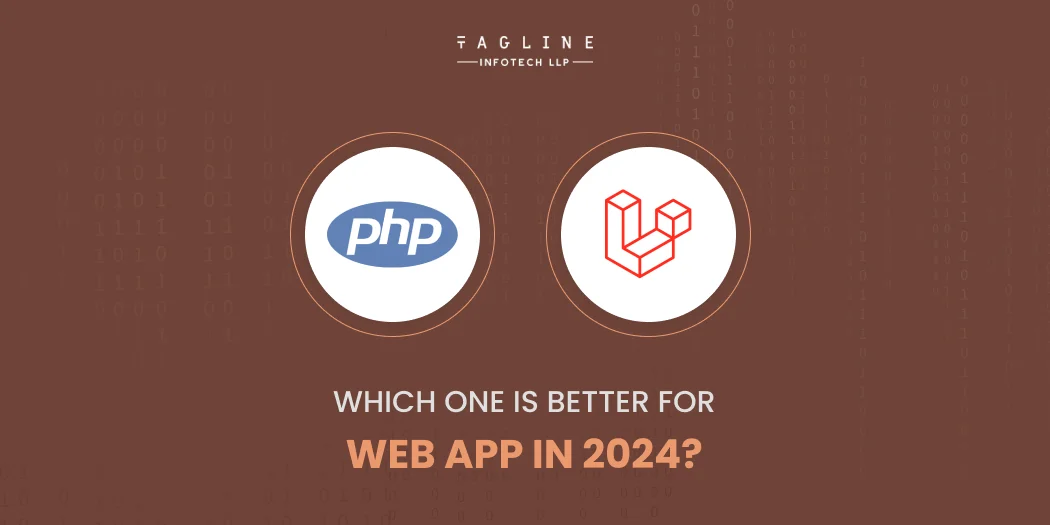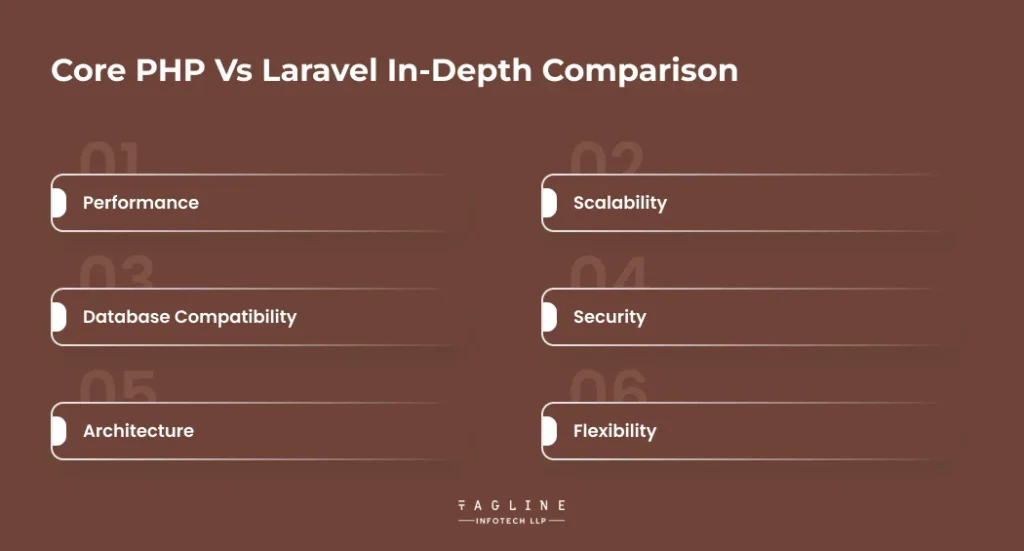Finance & IT Email Marketing: A Data-Driven Approach
February 2, 2026
Home >> Laravel >> Core PHP vs Laravel: Which One Is Better for Web App in 2024?

Quick Summary
Core PHP vs Laravel Uncover the better choice for your web app development journey? While Laravel is a straightforward web framework that facilitates the large-scale creation of extensible PHP-based websites and web apps, Core PHP is a pure PHP language used to construct dynamic web pages. However, our experiences with Laravel and Core PHP are dissimilar. Let’s now review our grasp of Laravel vs. Core PHP before sharing our experience deciding between the two frameworks:
The programming language PHP, or Hypertext Preprocessor, lets you automate several server-side web development chores. All PHP frameworks—including Laravel—use PHP as their primary programming language. This all-purpose programming language incorporates HTML code and may be used to create database-driven apps, dynamic webpages, and eCommerce websites. The primary justification for using PHP to develop your web application is that it doesn’t require third-party tools or libraries, which helps you write less code and finish the development process faster.
A web development framework called Laravel, built on PHP, aids in creating web application backends. Why use Laravel is a question we hear a lot. Alright! This is because it highlights a sophisticated and expressive syntax that fosters creativity and fulfilment in the creation process—simplifying the processes involved in web development, including HTML templating, routing, caching, sessions, and authentication. Laravel facilitates the development process without compromising the functionality of the application. Additionally, it has several features to assist you in expediting the development process, like integrated unit testing, inverted control containers, expressive migration systems, and many more. Developing social media platforms, SPAs, eCommerce websites, and online portals with a lot of data are Laravel’s main uses.
| Agenda | Laraval | Core PHP |
|---|---|---|
| Structure | MVC | Modular |
| Learning Curve | Complicated | Simpler |
| Database Support | provided | provided |
| Routing | In-built | Third-party or Manual |
| Exception and Error handling | In-built handling | Third-party or Manual |
| Community and Ecosystem | Active and Extensive | Limited |
| Testing Support | In-built PHP | Third-party or Manual |
“Laravel 11: What’s New? Upcoming Updates and Features “
– Also Read Article
Before starting a project, it is crucial to comprehensively review the advantages and disadvantages of any programming language and development platform. This analysis aids in reducing potential hazards and improving understanding of them throughout the development process. Here, we’ll look at the benefits and drawbacks of using Core PHP instead of Laravel.
Finding it challenging to decide between Core PHP and Laravel for your web app development?
Allow our developers to guide you in making informed decisions and enhance the performance, scalability, and development speed of your web applications!

Performance is the most crucial factor to consider while completing the technical stack for your next project. The efficiency with which the request processing attribute is evaluated increases with performance level. In general, Core PHP outperforms Laravel when comparing their respective speeds. This can be attributed to Core PHP’s increased concurrency rate, which allows it to simultaneously process and respond to several user requests.
The ability of your technology stack to interact with new technologies is always the best option for enhancing the functionality of enterprise solutions. Core PHP and Laravel are the backends with the most vibrant communities. Because of this, they are continuously being updated with the newest parts, which leads to the integration of the Cloud Infrastructure into the application and allows you to scale up the resources as needed to meet your growing business needs.
Databases are a must-have if you want to increase your application’s effectiveness. They help with the data collection, organization, and analysis of the information your web application gathers in response to user requests. Four of the most popular databases are currently supported by Laravel: SQL, SQLite, MySQL, and PostgreSQL. This guarantees that the communication channel remains open and enables the web application to create several connections with different databases.
On the other hand, if Core PHP is considered, it can be easily integrated with any database, including DB2, MySQL, Oracle, MongoDB, and other comparable databases. Additionally, switching between databases is made easy by the built-in modules and functions of Core PHP. This is a significant benefit. Further, employing prepared statement support, OOPS-based syntax, exception handling, and API reusability helps product owners migrate user data without laborious programming. Additionally, continuous contact between the web application and the database is established because it uses PHP data objects, guaranteeing a flawless data transaction channel.
The security data is stored in the database, and the organization’s primary duty is maintaining the transmission path. Regarding the company’s reputation in the market and financial resources, even a tiny data leak can have serious consequences. When comparing the dimensions of providing data integrity and secrecy between Core PHP and Laravel, Laravel offers a higher level of security because its structure is either massive or well-established.
The architecture of a technology stack plays a critical role in delivering the best possible experience for your online application. Even if the efficiency of your business solution is closely correlated with the speed of your web application and the security of your data. When contrasting Core PHP with Laravel, Core PHP offers features like separating the representation and logic layers. With the help of this feature, companies can swiftly establish data pathways that will allow them to accept and process user data inputs flawlessly.
On the other hand, the MVC architecture used by Laravel allows programmers to divide a web application’s front and back end precisely. As a result, there is an increase in efficiency since the interface designers and backend developers may work on the project concurrently and quickly. Additionally, the MVC architecture helps websites rank higher in search results by giving them more flexibility to adjust to specific marketing strategies.
When using Core PHP, you can introduce additional notions beyond the preset structures of frameworks. It is sometimes called the custom-based framework because it gives your project new features and boosts its efficiency.
However, Laravel uses the MVC design, a practical framework for projects that contain a significant amount of unstructured code. This facilitates understanding of the coding structures, which promotes understanding the workflow. This offers more assistance inside this framework and enables exceptional performance.
For your next web application development project, we have covered all the facts you need to know in this post to help you decide between Laravel and Core PHP as the ideal technology stack. And thus! The Core PHP programming language comes in handy when you want to produce an application with a small number of external dependencies, flexibility, and an efficient code structure. You can get in touch with a Laravel development company who can provide the best Laravel-based solution for your business. Furthermore, Laravel’s efficiency, data transmission, error and exception handling, security, caching, and code reuse contribute to its competitive edge. With this knowledge, your project’s demands and requirements will ultimately define the best action.
We hope this blog post has helped you comprehend how Core PHP and Laravel could help your project and how to get the best out of the best to present your business and its customers with an outstanding product. We can conclude that Laravel is an automated solution for achieving the same goal or intent, while Core PHP is the manual way to achieve it.
Yes, core PHP is still used by developers for many websites, and as per the trend, it’s going to stay relevant for the next few years.
You should think about using Laravel over core PHP because it is a PHP framework that provides different types of features to ease the web development process.

Digital Valley, 423, Apple Square, beside Lajamni Chowk, Mota Varachha, Surat, Gujarat 394101
D-401, titanium city center, 100 feet anand nagar road, Ahmedabad-380015
+91 9913 808 2851133 Sampley Ln Leander, Texas, 78641
52 Godalming Avenue, wallington, London - SM6 8NW